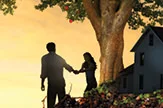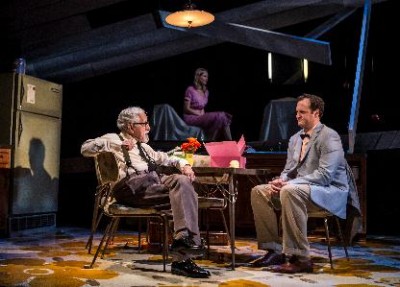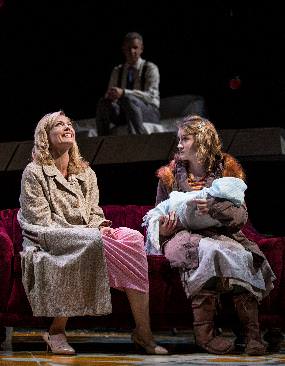Smokefall 2014

By Noah Haidle
Directed by Anne Kauffman
Produced by Goodman Theatre
Learning to accept mediocrity
In Thornton Wilder’s Our Town, the dead learn too late they never appreciated family love enough. The narrator comments wistfully that only saints and poets have some idea of the beauty that passes them by. But seventy-six years later, Noah Haidle’s play Smokefall points out how difficult it is to appreciate life when it is disappointing and love when it lacks potency.
Haidle is audacious to begin his play by so heavily referencing Our Town. We begin with a narrator (Guy Massey) giving a lecture on the local churches, though this time we are in Grand Rapids, Michigan. A mother, Violet (Katherine Keberlein), is making breakfast for her middle-class family, but with a simper that would appall the hard-eyed women of Grover’s Corners. And instead of ladders on a blank stage, we have a steeply slanted set by Kevin Depint which could be a bisection of a house, except for the grass-covered stairs and yawning void for a back wall. We also don’t get information about anybody outside this one family. Community evidently isn’t a factor in this story.
Over about twenty-eight narrative footnotes, we learn that how dysfunctional this family is. Mike Nussbaum, who is as old as the Goodman, plays a senile clown thirteen years his junior, Violet’s father. He still insists on the authority due to him as a colonel, but has the memory and continence of a goldfish and has to re-discover his wife’s death every day. Violet’s daughter Beauty (Catherine Combs) eats dirt, so that’s what Violet feeds her. That along with Combs’s blank face and affectless voice on the rare occasions Beauty speaks led me to think she’s autistic, but we learn in Act II she’s more like an elf. The father, Daniel (Eric Slater), was already fed up with his family before the discovery that his wife is expecting twins, who are due any minute. While Violet whispers reassurances to her fetuses that are as saccharine as they are unconvincing, he decides to leave forever. Before going, he tells Beauty she’ll understand when she’s older how difficult it is to love people once the novelty wears off.
Nussbaum gets a part worthy of him in Act II, as John, one of the fetuses from Act I. Now a bitter retired scholar of Russian literature, he kindly informs his own son (Massey) that everybody in this family inevitably fails because they lack both the talent to achieve their dreams and the social skills required to rely on others. But an unexpected visitor with some very strange luggage arrives to teach him there are still parts of themselves deep down they weren’t aware of.
This play actually has a lot of humor, though it was clearly more to the taste of other people in the audience than mine. A lot of people who are probably parents laughed at a scene in which Massey and Slater play fetuses. I found it grotesque. I also wished Act I had more going on than a narrator telling us about the characters we spend forty minutes watching, or fetuses discussing Christian metaphysics and the brilliance of their own play. But this build-up does pay off in Act II, when Haidle finally gets to his point about love being a labor with subtle rewards, and director Anne Kauffman found the right level of introspection and compassion to sell it. Costume designer Ana Kuzmanic has the difficult job of attiring characters in each act who are separated from each other by about eighty years, but whose exact time is left undefined. The set, being the Colonel’s house, is hard to put a date on. He apparently hasn’t renovated since the sixties. A cataclysm right before intermission finally makes full use of the space, and David Weiner and Lindsay Jones’s lighting and sound designs.
Since my last review was All My Sons, I was especially intrigued by these characters’ relationships with the apple trees they plant to celebrate new births. At what point does the tree become disconnected from the person it represents? Is it an insult not to keep it healthy indefinitely? And most pertinent, what does it mean when loving a tree is easier than loving a person?
Recommended
Jacob Davis
Date Reviewed: September 29, 2014
For more info checkout the Smokefall page at theatreinchicago.com
Located in the Albert Theatre in the Goodman, 170 North Dearborn St, Chicago, Il, 60601
$25-69, Box office: 312-443-3800, running time is 2 hours with intermission, through October 26, 2014


